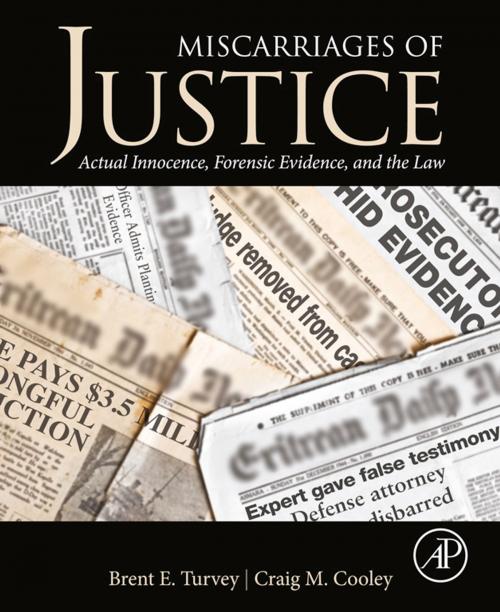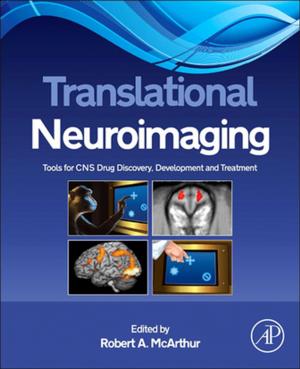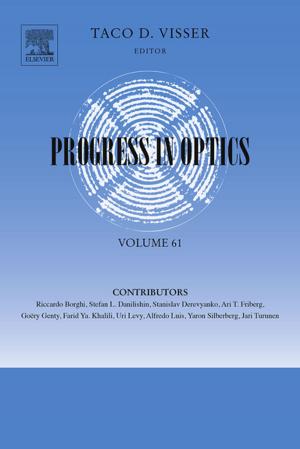Miscarriages of Justice
Actual Innocence, Forensic Evidence, and the Law
Nonfiction, Reference & Language, Law, Forensic Science, Criminal law| Author: | Brent E. Turvey, Craig M Cooley | ISBN: | 9780124095281 |
| Publisher: | Elsevier Science | Publication: | May 19, 2014 |
| Imprint: | Academic Press | Language: | English |
| Author: | Brent E. Turvey, Craig M Cooley |
| ISBN: | 9780124095281 |
| Publisher: | Elsevier Science |
| Publication: | May 19, 2014 |
| Imprint: | Academic Press |
| Language: | English |
Miscarriages of justice are a regular occurrence in the criminal justice system, which is characterized by government agencies that are understaffed, underfunded, and undertrained across the board. We know this because, every week, DNA testing and innocence projects across the United States help to identify and eventually overturn wrongful convictions. As a result, the exonerated go free and the stage is set for addressing criminal and civil liability. Criminal justice students and professionals therefore have a need to be made aware of the miscarriage problem as a threshold issue. They need to know what a miscarriage of justice looks like, how to recognize it's many forms, and what their duty of care might be in terms of prevention. They also need to appreciate that identifying miscarriages, and ensuring legal remedy, is an important function of the system that must be honored by all criminal justice professionals. The purpose of this textbook is to move beyond the law review, casebook, and true crime publications that comprise the majority of miscarriage literature. While informative, they are not designed for teaching students in a classroom setting. This text is written for use at the undergraduate level in journalism, sociology, criminology and criminal justice programs - to introduce college students to the miscarriage phenomenon in a structured fashion. The language is more broadly accessible than can be found in legal texts, and the coverage is multidisciplinary. Miscarriages of Justice: Actual Innocence, Forensic Evidence, and the Law focuses on the variety of miscarriages issues in the United States legal system. Written by leaders in the field, it is particularly valuable to forensic scientists and attorneys evaluating evidence or preparing for trial or appeal in cases where faulty evidence features prominently. It is also of value to those interested in developing arguments for miscarriage in post-conviction review of criminal cases. Chapters focus specifically on issues of law enforcement bias and corruption; false confessions; ineffective counsel and prosecutorial misconduct; forensic fraud; and more. The book closes by examining innocence projects and commissions, and civil remedies for the wrongfully convicted. This text ultimately presents the issue of miscarriages as a systemic and multi-disciplinary criminal justice issue. It provides perspectives from within the professional CJ community, and it serves as warning to future professionals about the dangers and consequences of apathy, incompetence, and neglect. Consequently, it can be used by any CJ educator to introduce any group of CJ students to the problem.
- Written by practicing criminal justice professionals in plain language for undergraduate students
- Covers multiple perspectives across the criminal justice system
- Informed by experience working for Innocence Projects across the United States to achieve successful exonerations
- Topical case examples to facilitate teaching and learning
- Companion website featuring Discussion topics, Exam questions and PowerPoint slides: http://textbooks.elsevier.com/web/Manuals.aspx?isbn=9780124115583
Miscarriages of justice are a regular occurrence in the criminal justice system, which is characterized by government agencies that are understaffed, underfunded, and undertrained across the board. We know this because, every week, DNA testing and innocence projects across the United States help to identify and eventually overturn wrongful convictions. As a result, the exonerated go free and the stage is set for addressing criminal and civil liability. Criminal justice students and professionals therefore have a need to be made aware of the miscarriage problem as a threshold issue. They need to know what a miscarriage of justice looks like, how to recognize it's many forms, and what their duty of care might be in terms of prevention. They also need to appreciate that identifying miscarriages, and ensuring legal remedy, is an important function of the system that must be honored by all criminal justice professionals. The purpose of this textbook is to move beyond the law review, casebook, and true crime publications that comprise the majority of miscarriage literature. While informative, they are not designed for teaching students in a classroom setting. This text is written for use at the undergraduate level in journalism, sociology, criminology and criminal justice programs - to introduce college students to the miscarriage phenomenon in a structured fashion. The language is more broadly accessible than can be found in legal texts, and the coverage is multidisciplinary. Miscarriages of Justice: Actual Innocence, Forensic Evidence, and the Law focuses on the variety of miscarriages issues in the United States legal system. Written by leaders in the field, it is particularly valuable to forensic scientists and attorneys evaluating evidence or preparing for trial or appeal in cases where faulty evidence features prominently. It is also of value to those interested in developing arguments for miscarriage in post-conviction review of criminal cases. Chapters focus specifically on issues of law enforcement bias and corruption; false confessions; ineffective counsel and prosecutorial misconduct; forensic fraud; and more. The book closes by examining innocence projects and commissions, and civil remedies for the wrongfully convicted. This text ultimately presents the issue of miscarriages as a systemic and multi-disciplinary criminal justice issue. It provides perspectives from within the professional CJ community, and it serves as warning to future professionals about the dangers and consequences of apathy, incompetence, and neglect. Consequently, it can be used by any CJ educator to introduce any group of CJ students to the problem.
- Written by practicing criminal justice professionals in plain language for undergraduate students
- Covers multiple perspectives across the criminal justice system
- Informed by experience working for Innocence Projects across the United States to achieve successful exonerations
- Topical case examples to facilitate teaching and learning
- Companion website featuring Discussion topics, Exam questions and PowerPoint slides: http://textbooks.elsevier.com/web/Manuals.aspx?isbn=9780124115583















